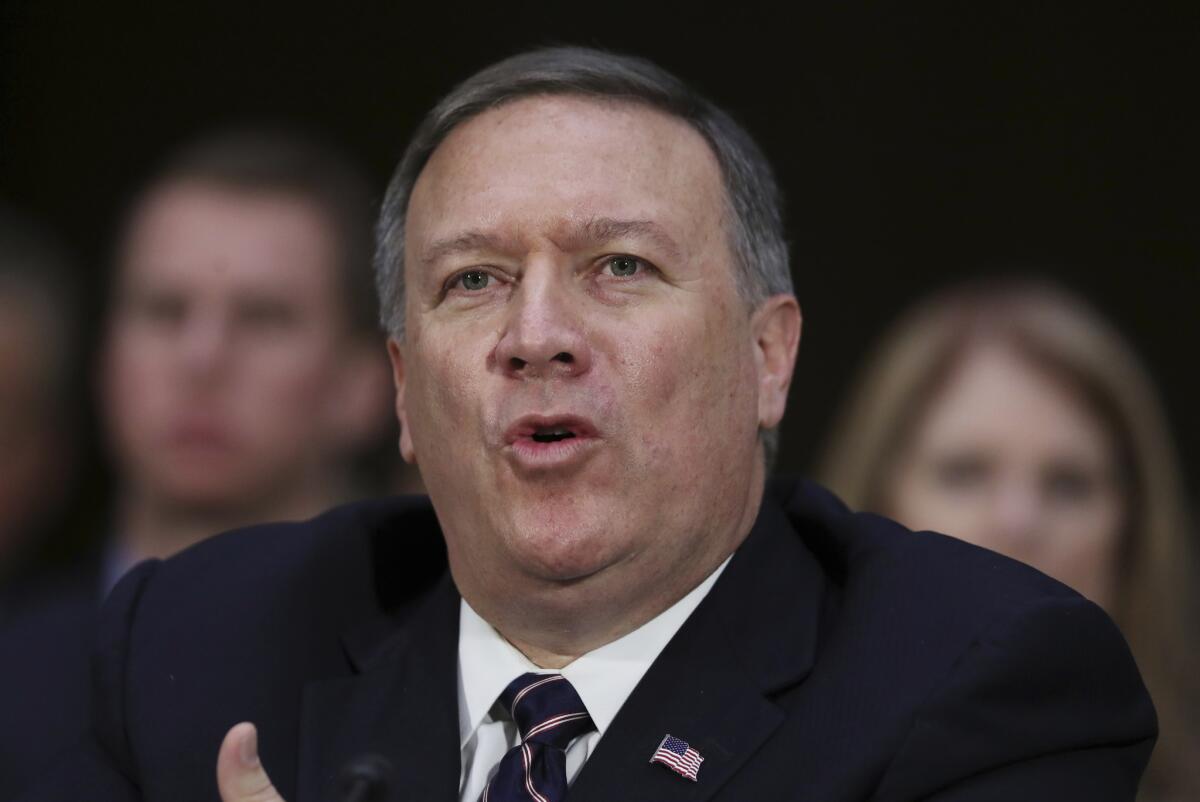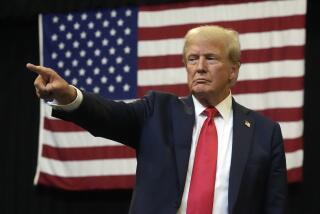Under Trump, the U.S. emphasis on human rights abroad is shifting toward religious protections

- Share via
WASHINGTON — Little by little President Trump and America’s top diplomat, Michael R. Pompeo, are revamping the nation’s approach to advocating for human rights abroad, cozying up to some of the world’s worst offenders and prioritizing religious freedom — particularly for Christians — often at the expense of poor women, gay people and other marginalized communities.
Secretary of State Pompeo, who says his Christian faith permeates his policy, is calling for America to shift its human rights focus to the principles of individual liberty espoused by the nation’s founders, even if that means backing away from the modern-day priorities that have become most associated with the international human rights movement.
At the same time, he and Trump have embraced dictators who were once shunned by U.S. officials, particularly those leaders who profess a devotion to the protection of Christians.
Of course, every U.S. administration highlights its favored causes, and shifts are starkest when the presidency changes political parties.
But Pompeo, through the announcement of new programs, cancellation of older ones and shifts in focus, has guided the Trump administration into nothing short of a new definition of human rights, activists and former officials say.
“Trump and Pompeo want to pick and choose among rights to pursue their socially conservative agenda,” said Kenneth Roth, head of Human Rights Watch. “That’s music to the ears of the world’s autocrats, who want to pick and choose among rights, too.”
Pompeo has placed singular priority on religious freedom, frequently lamenting the plight of Christians in the Middle East. But critics say that emphasis often clashes with other rights once prioritized by the U.S., such as freedoms for gays and lesbians, including same-sex marriage, and women’s reproductive rights.
The administration’s determination to fight on this score figured prominently in a landmark measure at the United Nations earlier this year to condemn sexual violence against women as a tool of war. The U.S. delegation, under Pompeo’s instruction, threatened to veto the measure because it called for “sexual and reproductive health services” for women and girls who are victims of rape. Only when that phrase was removed did the U.S. go along.
Pompeo, who says the administration cares deeply about human rights abroad, acknowledges he wants to revamp U.S. policy on human rights.
“The time is right for an informed review of the role of human rights in American foreign policy,” Pompeo said earlier this month in announcing the creation of a human rights commission to promote “unalienable rights.”
He suggested that America’s focus on human rights had drifted from what he called the founding fathers’ core beliefs and values to specious “claims” for protection and “ad-hoc rights.” In a Wall Street Journal essay, Pompeo added, “Loose talk of ‘rights’ unmoors us from the principles of liberal democracy.”
Critics quickly noted that the era of the founders included slavery and a right to vote limited to white male landowners.
The initiative was criticized by activists, Democratic lawmakers and former diplomats who worried the committee’s findings will be used to roll back protections of marginalized communities in some countries. Often those communities have no one other than the U.S. and European nations to advocate for their needs.
The Commission on Unalienable Rights, as it is formally known, will be led by Mary Ann Glendon, a history professor, staunch antiabortion activist and former U.S. ambassador to the Holy See. Pompeo studied under Glendon at Harvard in the 1990s. She said that “basic” human rights are being “misunderstood by many, manipulated by many.”
Human rights activist Serra Sippel said in a telephone interview from Zambia that the administration’s moves were “outrageous,” leading to funding cuts in Africa and other places for family planning and AIDS prevention.
“They are seeking [to declare] ... whose rights to keep. That’s what this is really about,” said Sippel, president of the Washington-based Center for Health and Gender Equity.
It’s unclear why the commission was necessary since the State Department already has a large division dedicated to human rights and the promotion of democracy. The division produces annual reports on how each of nearly 200 countries handles human rights, studies that are widely praised as authoritative and thorough.
Rep. Eliot L. Engel (D-N.Y.), chairman of the House Foreign Affairs Committee, said he would seek to block funding for the commission, which he called a “bizarre effort” that has no place in the State Department.
“The secretary wants to make an end-run around established structures, expertise, and the law to give preference to discriminatory ideologies,” Engel said.
The administration’s failure to take to task autocratic human rights abusers, such as Egypt’s President Abdel Fattah Sisi and the crown prince of Saudi Arabia, Mohammed bin Salman, has also raised eyebrows.
“President Trump’s personal affection for gross human rights violators has stained America’s moral fabric,” said New Jersey’s Sen. Robert Menendez, the ranking Democrat on the Senate Foreign Relations Committee.
When Pompeo visited Cairo earlier this year, he praised Sisi as a champion of religious freedom because he allowed the building of a Coptic Christian church — ignoring the Egyptian dictator’s record of killing and imprisoning dissidents.
“It is very disappointing for these words to come from someone like Pompeo,” said Amr Magdi, an Egyptian who is the Middle East and North Africa researcher for the U.S.-based Human Rights Watch.
“He is buying in to the Egyptian government’s propaganda,” said Magdi, adding that religious oppression in Egypt remains a problem.
“You don’t promote freedom by building a big church,” he said.
Pompeo cites an annual international conference on religious freedom that he created as evidence of his commitment to human rights. He hosted its second iteration last week. Persecution of all faiths is discussed, but participants from last year’s conference, also held in Washington, said Christianity and the plight of Christians received the most attention.
Pompeo has defended his emphasis on religious freedom by saying all rights spring from religious rights.
“The task that I have is informed by my understanding of my faith, my belief in Jesus Christ as the savior,” Pompeo told an interviewer earlier this year. He keeps an open Bible on his office desk, he says, “to remind me of God and his word, and the truth.”
In the spring, Pompeo expanded bans on funding for health organizations throughout the world that include abortion counseling among their services. The restrictions are known as the gag rule, which Democratic administrations tend to suspend and Republican ones revive.
“American taxpayer dollars will not be used to underwrite abortions,” Pompeo said.
But health advocates say that healthcare has been increasingly integrated, especially in poor and rural areas, so when money is cut off to a clinic because it imparts information on abortion, services for other patients, including boys and men, are also affected.
In Mozambique, for example, “gag rule” cuts forced a main youth HIV prevention center to lay off all its staff, Sippel said.
In Zimbabwe, she added, women looking to remove their contraceptive implants were unable to — because the only health clinics able to help had lost their U.S. funding.
More to Read
Get the L.A. Times Politics newsletter
Deeply reported insights into legislation, politics and policy from Sacramento, Washington and beyond. In your inbox three times per week.
You may occasionally receive promotional content from the Los Angeles Times.











